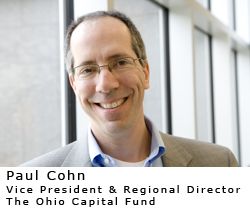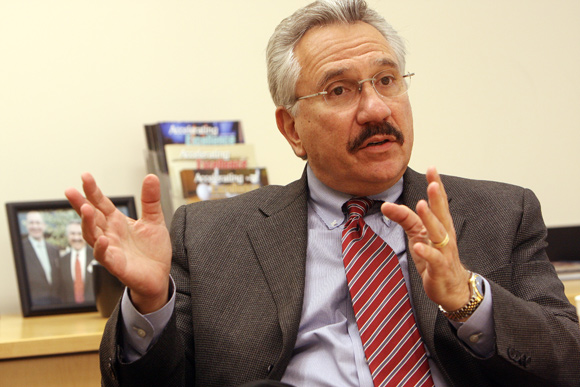by Jennifer Brunner
After speaking to the District 4 meeting of the Communication Workers of America on Wednesday last week, I made my first stop on our campaign’s Innovation Tour for Ohio Jobs, traveling to Meridian Bioscience, Inc.
This company is the largest employer and taxpayer in Newtown, Ohio just inside the Hamilton County border almost to Clermont County. Meridian’s history is compelling. Its founder, Bill Motto, started the company in 1975 with a $500 investment working out of his garage. The company is now a $139 million dollar company publicly traded on the New York stock exchange with American and European subsidiaries in Florida, Maine and Tennessee, and in France, Italy, Belgium and the Netherlands and more than 400 employees with nearly 250 right here in Ohio in the Newton home office.
Meridian manufactures and distributes medical diagnostic test kits and related products throughout the U.S., and to over forty countries in Europe, Africa and the Middle East. This is the mainstay of its business.
Meridian also enhances medical research and diagnosis through its U.S. subsidiary, Medical Life Science, Inc., which supplies reagents (critical to analysis and examination), antigens, antibodies, and contract biological R&D and manufacturing services to the research, diagnostic, and biopharmaceutical markets. In short, Medical Life Science is a supplier for markets involved in purchasing biomedical reagents in bulk and in both discovering and developing drugs and vaccines for medical advancement.
For those not medically inclined, I looked up the definition of a “reagent” and found that it is defined as a substance that, because of the reactions it causes, is used in analysis and synthesis, that is, a substance used in a chemical reaction to detect, measure, examine, or produce other substances. For instance, the lines on a testing kit mark a reagent that reacts with the appropriate bodily fluid to show the presence of another substance in the system. A reagent allows for the detection of the presence of a particular bacteria or virus, or even a foreign substance such as a drug in a persons’ bodily system.
When we arrived at Meridian, we met with Bill Motto, now Executive Chairman of the Board; Jack Kraeutler, CEO; and Larry Baldini, VP Operations and Information Systems. Larry led us on our tour. We met Rita at the front desk, and Brenda did a great job arranging our visit. We met many other employees as we traversed the various areas of this large manufacturing and distribution plant.
I have toured a number of factories while running for the Senate, and I’ve begun to see the similarities of many factory floors regardless of the items produced—car batteries, coins or medical testing kits. There is the shiny light gray floor, wide yellow tape or paint strips to make a walking path through the factory, sophisticated equipment behind plexiglass, the wearing of protective eyewear, and in this case, a disposable white lab coat. There are neatly stacked supplies, raw and compound material used in production, and packing material for shipping. At Meridian all employees wear white lab coats, and they have lockers for their belongings. There are signs throughout the factory reminding the employees that accuracy is important, that lives depend on it.
It was when I viewed a sign like this and watched the easy and respectful manner with which the employees interacted with each other and management that I started taking notice of the importance of a corporate culture, especially in an organization where lives depend on their work. I realized that, as in many endeavors, principled leadership is key.
Even though my state agency is one of just under 200 employees, I understand this well. While we don’t produce medical products, we work to protect votes and improve voter participation. While we don’t hand out money for Ohio businesses, we make sure a business can stay in business and that valuable business names and associated goodwill can be protected. While we help businesses secure their personal property interests in assets they have financed, we protect the private information of those businesses and debtors by redacting that information before we make it available to the public. While we don’t set the policy agenda for state agencies, we collect their information in one place and tell the story of the people of Ohio with a web-based life quality index that lets citizens and organizations see and judge for themselves what their government is doing.
I talked to Larry about leadership philosophy. Part of the corporate culture is how management handles the making of a mistake. Management would rather have the mistake reported so that it can be corrected, so Meridian’s corporate culture rewards the reporting of a mistake, because lives depend on this kind of honesty. In this business a mistake is a risk. I learned in our EVEREST voting machine security study in 2007 in the Secretary of State’s office, a risk is subject to two conditions: 1) can it be discovered?, and 2) can it be recovered from? Risks that are discoverable are more likely to able to be recovered from. So, if a mistake is reported, it is more likely to be corrected. And this is important, especially when lives depend on it.
Larry pointed out that from a management standpoint, when some mistakes are reported, he’d like to go punch a pillow, but he maintains a calm demeanor to encourage the future reporting of mistakes without fear. Leadership based on motivating desire to do the right thing and not fear of the consequences of a mistake is essential to this kind of quality assurance.
We walked into huge walk-in freezers containing compounds and test kits, saw rooms with air systems that gently blew air out of the rooms where testing and development are done, and as I’ve noticed before, the aspects of assembly or distribution that require finer dexterity and detailed examination and handling seem to be staffed by all or nearly all women
Larry asked Brian to start up one of the plant’s robotic machines that has been built by a Dayton robotic company. One of the two robotic equipment suppliers for the plant had previously custom built and supplied robotic equipment to the automotive industry; now Meridian was a customer. Management remarked that it’s unlikely they would have worked with Meridian before the downturn in the auto industry, but it was working now. For Meridian, the importance of having this service provided locally cannot be overemphasized. The machine has to be custom built to specs provided by Meridian, and as its use begins, an engineer from the robotic company works with an engineer at Meridian to further customize the machine as operation and implementation move along.
This demonstrates the inter-connected nature of Ohio’s economy. As I pointed out in the urban initiative I rolled out through my Cleveland City Club speech in August, Ohio holds great potential to move to the forefront in clean energy and bioscience jobs, and it’s already happening.
In a post-tour debriefing with Jack Kraeutler and Bill Motto, we talked about the role of the Third Frontier in promoting some of these new technological medical and bioscience ventures. In fact, Jack sat on the Third Frontier committee, making decisions on ventures to be funded by this state bond initiative to further Ohio’s emerging tech economy. We discussed the role of Cincinnati Children’s Hospital in vital clinical trials to move forward new technology and medical advances.
Ohio’s economy, like its people, is amazingly diverse. The potential to grow Ohio’s economy needs effective leadership to forge public/private partnerships to communicate and develop and reward the adoption of best practices that bring about lasting and beneficial change. When you take a look at a world leader in bioscience like Meridian Bioscience, right here in Ohio, you know it starts with responsible individuals and organizations who work together, encouraged by effective leadership that remembers that not only do lives depend on us, but we are the spark to the engine of prosperity.
 Two weeks ago in Columbus, 500+ venture capitalists, entrepreneurs, and government leaders gathered to hear about the accomplishments of The Ohio Capital Fund (OCF) and our State’s growing venture capital community. (For those of you not familiar, OCF provides incentives for investors from outside Ohio to invest in companies based here). Due to the work of many, including the OCF, the Ohio Department of Development, and all of the other members of the venture community - Ohio has earned some serious bragging rights! Among the many great accomplishments shared at the OCF Summit, here are some of the most compelling:
Two weeks ago in Columbus, 500+ venture capitalists, entrepreneurs, and government leaders gathered to hear about the accomplishments of The Ohio Capital Fund (OCF) and our State’s growing venture capital community. (For those of you not familiar, OCF provides incentives for investors from outside Ohio to invest in companies based here). Due to the work of many, including the OCF, the Ohio Department of Development, and all of the other members of the venture community - Ohio has earned some serious bragging rights! Among the many great accomplishments shared at the OCF Summit, here are some of the most compelling:
 The
The  Google CEO Eric Schmidt envisions a radically changed internet five years from now: dominated by Chinese-language and social media content, delivered over super-fast bandwidth in real time. Figuring out how to rank real-time social content is "the great challenge of the age," Schmidt said in an interview in front of thousands of CIOs and IT Directors at last week's
Google CEO Eric Schmidt envisions a radically changed internet five years from now: dominated by Chinese-language and social media content, delivered over super-fast bandwidth in real time. Figuring out how to rank real-time social content is "the great challenge of the age," Schmidt said in an interview in front of thousands of CIOs and IT Directors at last week's 






